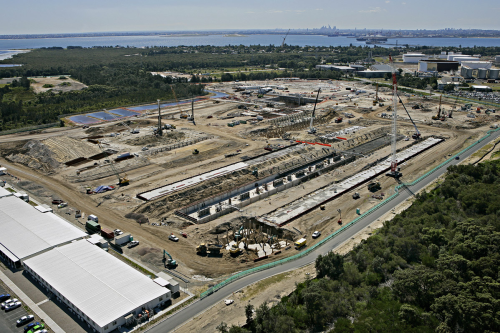
Veolia Water Solutions & Technologies, through its subsidiary company SIDEM and its MPG department, Veolia Water Solutions (VWS) has established a presence in multiple effect distillation (MED) and seawater reverse osmosis (SWRO).
The company is heavily involved in the Middle East, Europe and Australia. Although it primarily facilitates engineering and turnkey design and build projects, VWS also has an interest in pump technology and what is required from pump manufacturers. “We work with all the leading pump manufacturers that have proven products and materials suitable for seawater,” comments Sophie Bertrand, desalination process engineer of VWS. “The two most important factors that will influence our choice of supplier are energy efficiency and the availability of special materials, such as Super Duplex, that can withstand the corrosive nature of the seawater used in the processes,” she continues. “We also have to consider the proven experience that pump manufacturers have in this particular industry.”
Ashkelon plant
VWS itself does have considerable experience of the desalination industry. In the Middle East, the company has more than 70 desalination facilities, including the world's largest SWRO plant at Ashkelon in Israel. The company is also involved in the design and construction of the 800,000 m3/day desalination plant for Jubail Industrial City in Saudi Arabia. Based on SIDEM's MED process, the facility includes 27 desalination units and a remineralisation plant. Current involvement in the region includes the contract for building a hybrid plant (MED and SWRO) at Qidfa in the Emirate of Fujairah, with a capacity of 590,000 m3/day.
“As desalination plants are getting far bigger in size, we now require pumps that have a far higher pumping capacity. This does place a restriction on the number of companies that we can turn to, as not all of them have the experience and application references that our clients demand. Pump manufacturers with which we have worked on projects around the world include Sulzer, Torishima, Nijuis, Weir, Flowserve and KSB.”
Middle East
While great consideration is afforded to the selection and specification of high pressure process pumps, VWS has to ensure that where seawater intake pumps are being specified, they are able to cope with the vast quantities of water that are required and the nature of the water being pumped.
“Water salinity and quality differs around the world. In the Middle East there is high salinity and higher temperatures to contend with, so we do have to pay particular attention to the materials used in the construction of the pumps,” says Bertrand. “Currently we are using Torishima and Nijuis pumps for the 125,000 m3/day design-build-operate Gold Coast Desalination Plant contract in Queensland, Australia.”
Also in Australia, in a joint venture with John Holland, VWS is now developing a 250,000m3/day SWRO plant for the Sydney Water Corporation. This project consists of intake and outlet tunnels, seawater pump station, pre-treatment filters, two pass reverse osmosis process, post-treatment and 40,000 m3 storage. Future expansion of the plant up to 500,000 m3/day has been taken into account.
Energy efficiency
One of the main issues that all desalination plant operators give consideration to at the design stage is energy efficiency and how the plant can be operated most economically throughout its design life. VWS does use energy recovery devices in order to meet this requirement, but that does not rule out the need for pump manufacturers to be able to demonstrate the efficiency of their products. “Our goal is to produce potable water at the lowest possible price throughout the operating life of the treatment plant,” says Bertrand.
"Most of our contracts now require the plant to operate for 25 or 30 years, " she adds. "In order to sustain the highest levels of efficiency from day one, we need to work with equipment providers that have the resources to fully support their products through maintenance and spare parts availability.
It is inevitable that after a number of years, pumps may have to be refurbished or even replaced in order to maintain operating efficiency. This does provide us with the opportunity not only to fully evaluate the performance of the pumps but also the pump manufacturer.”
Submitting tenders
The support and technical input of the pump manufacturer, together with a global presence, would appear to be an influencing factor on the companies with which VWS works. “We do appreciate the input that pump manufacturers can give us, but at times obtaining detailed information from pumps manufactures can be difficult,” says Bertrand.
“Because we require so much technical information during the tender stage, the amount of time that suppliers have to commit can be lengthy, which is possibly why some companies can actually be deterred from submitting tenders. But we do keep a very close watch on emerging technologies and wherever there is an opportunity to introduce new technologies that will contribute to greater plant efficiency and drive down the cost of the finished product we shall evaluate its potential.”
VWS considers that there are many opportunities arising for pump manufacturers as the costs involved in producing potable water are coming down and the number of projects around the world increases. For VWS, the prospects for its MED and Hybrid technologies in the Middle East are many. In other parts of the world, it is membrane desalination technology that will continue to make substantial advances. Regardless of the various desalination processes, there is always going to be constant demand for pumps.






